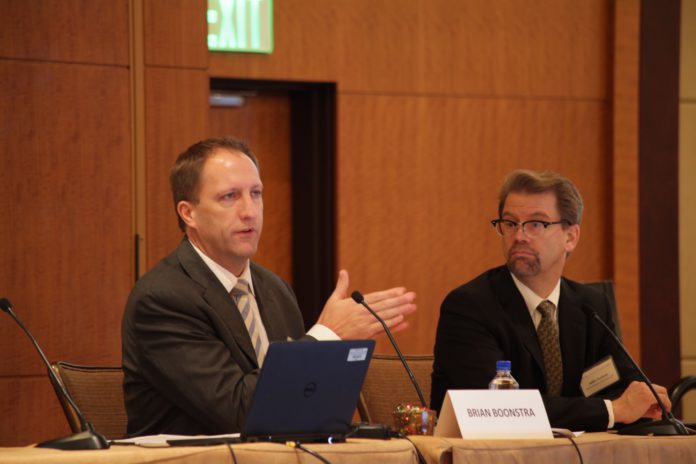

The more things change, the more they stay the same. As a new presidential administration shifts the landscape of corporate regulations, securities litigation remains on the rise.
Panelists from Davis Graham & Stubbs previewed these and other pressing topics facing corporations at the start of 2018. DGS presented its 16th Annual Public Company Update to an audience of attorneys, business leaders and accounting professionals Thursday morning at the Denver Four Seasons Hotel.
DGS attorneys started off the morning by breaking down the Securities and Exchange Commission’s proposed updates to Regulation S-K. In October, the SEC issued a proposed rule to modernize and simplify disclosure requirements as mandated by the Fixing America’s Surface Transportation, or FAST, Act. The rules suggest tweaks to how companies need to handle a range of disclosures, from Description of Property to Material Contracts.
Perhaps the most significant fix proposed to Regulation S-K concerns the management discussion and analysis, or MD&A, section of companies’ 10-K reports, according to DGS co-managing partner Kristin Lentz. Companies currently have to provide year-over-year comparisons for the current year and the two previous; the rule would make it so companies need only compare the current year and the year prior.
That change alone should condense 10-K reports, Lentz said. “I think most people’s eyes do sort of glaze over when they start reading the prior years, because it is what it is.”
The panel also touched on the fact that more corporations are holding shareholder meetings via teleconference as opposed to in person. DGS associate Edward Shaoul said smaller-cap companies tend to use virtual shareholder meetings, though they’re becoming more common among larger corporations like Comcast and Hewlett-Packard. Shaoul said that some critics have accused companies of using virtual shareholder meetings to “cherry-pick” questions during meetings. But the SEC has a generally favorable view of them in the sense that they encourage transparency and shareholder engagement, he added.
DGS partner Lee Terry gave an overview of risk factors companies will want to consider for their 2018 SEC filings, and they would do well to acknowledge major shifts in the international political landscape, he said.
Brexit will introduce new economic realities for many SEC filers, as will growing tensions between the U.S. and North Korea, Iran, Russia and even traditional allies like Turkey under the current administration. “As we all know, the U.S. political climate is either more Trump, less Trump, or no Trump,” Terry said. Major geopolitical changes, he added, are “all real possibilities, and we need to pay attention to them.”
In a separate discussion, partners Brian Boonstra and John Elofson covered trending threats to public companies on the fronts of litigation and investor activism.

Public companies were hit with 415 total securities-related class action lawsuits in the past year, compared with 271 in 2016. “2017 was a very active year for you folks getting sued,” Boonstra told the audience. While companies are seeing fewer suits over mergers, the major uptick is in what he called “event-driven” suits, such as what Yahoo faced in the wake of its massive data breach.
Companies are still seeing the “Trulia Effect” that has diminished the number of disclosure-related lawsuits in Delaware and spread them to other venues. In its 2016 ruling in In re Trulia, Inc. Stockholder Litigation, the Delaware Court of Chancery held that it would no longer allow most disclosure-only settlements. But disclosure claims have still been increasing, and more of those suits are being filed in federal courts as opposed to in Delaware, Boonstra said. “But that avenue may not be open for long,” he added, given that federal courts are beginning to adopt the Trulia analysis on disclosure-only settlements.
Elofson and Boonstra also discussed trends in investor activism, which in general has been on the rise. There are still “full-time” activists in the vein of Carl Icahn nowadays, but more of them seem to be working with institutional investors. One example from last week was when Jana Partners and the California State Teachers’ Retirement System wrote a letter to Apple last week demanding the company do more to address iPhone addiction among children.
The field of occasional or first-time activists is also growing, Elofson said. “They’ve figured out it’s not really rocket science to be an activist, so if they don’t like how things are going, even if they’re passive in 95 percent of investments … they’re not afraid to take an activist stance in the remaining 5 percent.”
One of the ways companies are responding to activism is to “bring them into the tent” prior to major decisions or transactions — “asking for permission rather than forgiveness,” as Elofson said. But working to preemptively please activist investors has caveats, he added. “Just because you cut a deal with an activist doesn’t mean your shareholders are going to be happy.”
Closing the program was partner Jonathan Marks, who discussed executive compensation, the newly enacted tax bill and updates in ISS practices.
Starting this year, large companies must disclose in their SEC filings the compensation ratio between their CEO and their median employee.
“For those of you in this room who have not started doing your pay ratio update … you are way behind in the game,” Marks warned. Companies will want to start gathering their compensation data and figure out who their median employee should be for the purpose of the pay ratio calculation.
One of the tax reform bill’s most widely felt rule changes among public companies involves Rule 162(m) of the IRS Tax Code. Rule 162(m) places a $1 million limit on the corporate tax deduction that public companies may take on certain employees’ compensation each year.
Among many other effects of the rule change, the tax reform broadened 162(m) to apply to companies with only publicly traded debt, and it eliminated its exception for performance-based compensation, which was one of the common ways companies used to get around it.
“This is a huge change in the 162(m) landscape,” Marks said. Many public companies will be shifting their compensation schemes to adjust for that exception no longer being “part of the equation,” he added.
— Doug Chartier

